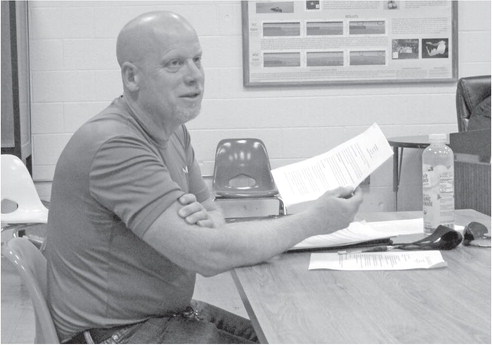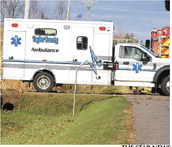Rib Lake board seeks block grant funds for road projects


The Rib Lake Village Board on May 20 held a public hearing and special meeting to begin the process of applying for Community Development Block Grant-Public Facilities (CDBG-PF) funding for the McComb Avenue and Landall Avenue street and storm sewer reconstruction project.
The McComb Avenue portion of the project would include new street reconstruction from building front to building front, including new asphalt pavement, curb and gutter, concrete sidewalks, and new concrete storm sewer. Adding additional storm sewer along McComb Avenue will provide better drainage along the street and will fix the storm sewer problems at the intersection with Landall Avenue.
The Landall Avenue portion includes replacing the storm sewer along Landall Avenue from the intersection with McComb Avenue down to Tannery Creek. Currently the storm sewer at this location is in “bad condition” and is undersized. The project includes street reconstruction along Landall Avenue from McComb Street to Mill Lane. This includes new asphalt pavement, curb and gutter and concrete sidewalks on both sides of Landall Avenue. The project also includes reconstructing the gravel parking area east of Mill Lane and complete restoration within the village park area.
The village initially planned to just reconstruct McComb Avenue and abandoned the storm sewer line under Landall Avenue to the east of McComb. Art Bahr of MSA Professional Services said the project was changed to reconstruct both McComb and Landall to the east to make the project “more attractive” to the state Department of Administration (DOA) and improve Rib Lake’s chances of receiving a grant.
The first estimated cost of the project was $1,102,526. At the time, MSA was not aware there was concrete under the blacktop on McComb, which is more expensive and time-consuming to remove. MSA revised the estimate upward to $1,140,664. If Rib Lake is awarded a grant, it would cover $753,658 of the cost. The village would be responsible for providing the remaining $387,006.
During the public hearing, Bahr gave an overview of the CDBG program and its history; explained what types of activities and projects are eligible for CDBG funding; briefly reviewed Rib Lake’s proposed project, and asked for citizen input regarding the proposed or other CDBG activities.
Clarence and Marge Kropp, who were attending the public hearing, said housing. Village president Bill Schreiner asked if they were referring to new housing or fixing up existing housing. The Kropps said they thought probably both. Schreiner said as far as fixing up houses, the village did have over $100,000 in a revolving loan program it can loan to people.
Following the public hearing, the board approved the following as the first steps in the grant application process:
_ Approved a contract agreement with MSA for $8,000 to submit the CDBG application on behalf of the village. Schreiner said the $8,000 would be well-spent if the village had a chance of receiving three-quarters of a million dollars to use toward the project and it was “worth a shot” to apply for the grant. He said there was money in the planning fund in the budget which hasn’t been used for a number of years that would cover the cost.
Schreiner asked if the village could recoup the $8,000 as part of the funding should a grant be awarded. Bahr said the state won’t allow the grant application fee to be included as part of the administration costs for the project. He said that was the risk Rib Lake was taking since the village would be out the $8,000 if it was not awarded a grant.
_ Approved a resolution to adopt a citizen participation plan. Bahr said the plan requires the village to hold public hearings at the beginning of the project, which it did that night, and again toward the end of the project to get citizen input as to if there were any problems or issues with the project. He said if the village has a community planning committee, it would qualify as the participation committee.
_ Adopted a resolution to submit the CDBG application. Bahr said the resolution lets the state know that the village is going to submit an CDBG application in the upcoming funding cycle. He said if any documents needed to be signed, other than ordinances and resolutions which needed the board approval, the village president would have the authority to do so.
_ Approved a resolution authorizing the village to commit other funds. Under the grant funding, the village of Rib Lake would be responsible for providing approximately one-third the cost of the project in matching funds. Bahr said the resolution would require the village to provide documentation from a financial institute showing it was willing to borrow the village the amount of the matching funds and didn’t have any issues with doing so or if the village already had the money budgeted and set aside to provide documentation showing it was in an account of some kind. He said it reassures the DOA that the village has already taken steps to secure its share of the project costs. Schreiner added the village did receive confirmation earlier in the day from Nicolet Bank that it was willing to loan the money to the village.
_ Approved a resolution adopting a policy prohibiting excessive force. Bahr said the policy deals with Section 104, Title I of the Housing and Community Development Act of 1974. He said what the act basically says is, if there is a peaceful demonstration or if the board is holding a meeting, especially one dealing with issues involving the CDBG, and someone wanted to demonstrate, the village would not use excessive force to remove them from the village’s property or bar any doors to limit entrance to the facility during the meeting.
_ Adopted a residential anti-displacement and relocation assistance plan. Bahr said if the project did require demolishing someone’s residence and that person needed to be relocated, the plan would make sure the village abided by all the federal laws and standards to fairly treat that person in how the village dealt with them, acquired their property, moved or relocated them, and so on. He said in Rib Lake’s case, none of these issues are involved since all the work is being done on public property, but the village still needs to adopt the plan.
_ Adopted a resolution to repeal and replace the village’s fair housing ordinance. Bahr said there were no issues with the wording in the villages fair housing ordinance but that the DOA has taken the stance that if the village is to say it abides by Section 106.5 of the Wisconsin State Statutes and uses the wording from that statutes, the village must use all the wording in full. “You can’t leave anything out. If you miss a period, if you miss a comma, if you miss anything else that could change the legal intent of the statute,” Bahr said. “So the DOA came out with this template which is titled on here Ordinance 16.29 which basically just says our housing ordinance is 106.5 State Statute of Wisconsin so if there is any issues with it, you refer straight to the state statute.”
Bahr said the reason MSA recommends Rib Lake change its fair housing ordinance when applying for these types of grants is because last year the city of Antigo lost out on one of the grants. He said Antigo had the previous statute of Section 104.9 and added “and any other further statutes as amended by the state.” Bahr said legally that would have been good, but it wasn’t for the DOA because it did not specifically state Section 106.5. As a result, he said, Antigo lost out on a $1 million grant. Bahr said since then, he automatically recommends clients go with the DOA’s template. “It’s from them, it’s worded by them and they can’t reject your application because of it.”
_ Adopted a village procurement policy. Bahr said by adopting the policy, it allows Rib Lake the flexibility to hire an engineering firm the village chooses based on Wisconsin State Statutes so the village wouldn’t have to go by federal statutes which required Rib Lake to put out bids for the engineering firm and thus increase the cost. He said the village would be able to hire an engineering firm they had worked with in the past and were familiar with. Bahr said the same would apply when it came to hiring someone to administer the grant. “It gives you more freedom and flexibility.”



